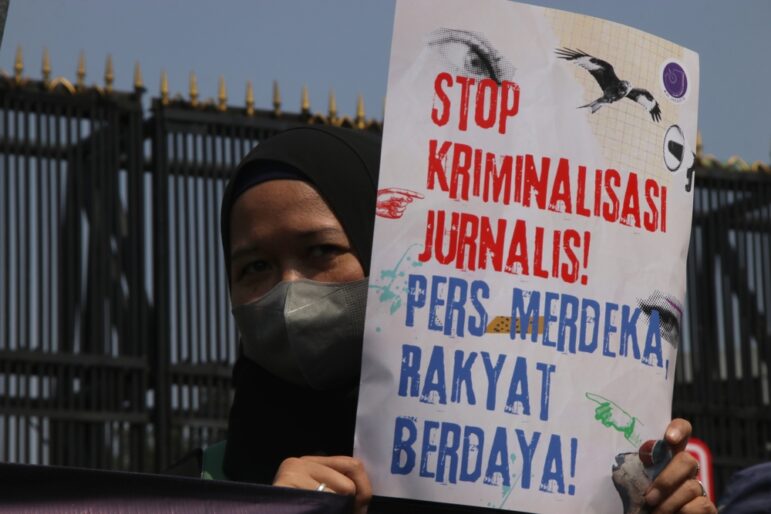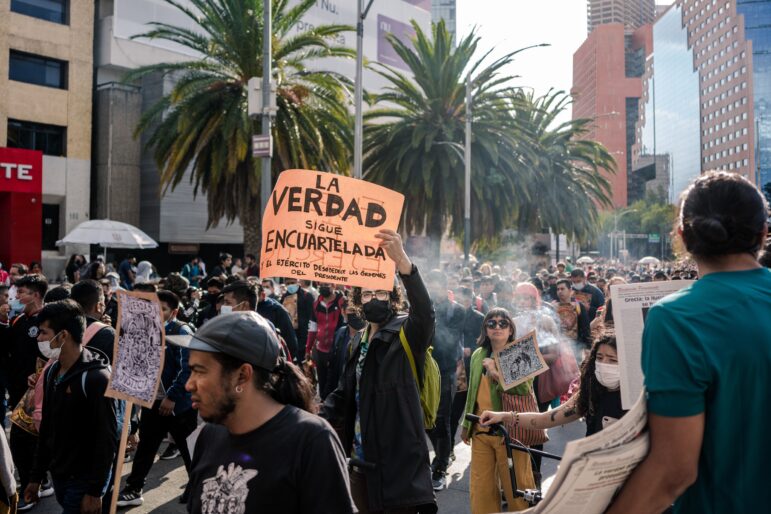

National security journalists face an asymmetric threat to source confidentiality from intelligence groups like the US National Security Agency. Image: Shutterstock
As Governments Attack the Media, Reporters Must Consider Their Responsibility to Protect Sources

Journalists face an asymmetric threat to source confidentiality from intelligence organizations like the US National Security Agency. Image: Shutterstock
When I became a reporter, I was surprised to discover a trait that I had never before recognized in myself.
People liked to talk to me. They liked to talk to me so much that they often revealed things they weren’t supposed to share. They did so voluntarily.
I noticed this when I was 23 and working in my first job as a reporter at the Journal Gazette in Fort Wayne, Indiana. One day, I was meeting with the director of the Fort Wayne Chamber of Commerce, the most pro-business man in town, when he suddenly told me to get into his car and drove me to a factory with no signs or exterior identification. He explained that the building I was looking at was the secret plant of a company trying to hide from regulators and labor unions. A few months later, I was standing in a large crowd of reporters covering a strike at International Harvester, then Fort Wayne’s largest employer, when someone who worked there walked up to me and whispered that I should follow him. When we got to his car, he opened the trunk to reveal boxloads of secret International Harvester documents — and told me to take all of them.
Things like that have continued to happen throughout my career, and I’ve been surprised every time. While I was working on a book about the anti-abortion movement, Joseph Scheidler, one of the nation’s leading anti-abortion extremists, gave me the keys to his Chicago office and told my co-author and me that we could spend an entire weekend going through his personal files by ourselves, with no one else around. We found lots of documents that made him look bad, and I never understood why he let us do it.
I’ve always thought of this strange capability as a trait rather than a skill, because I don’t recall ever doing anything to make it happen. In most fields, such a trait would be modestly helpful. But for an investigative reporter, it is all-important.
Yet for today’s investigative reporters, particularly in the field of national security reporting, being good at getting people to talk can seem like a curse.
In the 21st century, hatred of the press has become bipartisan, and government leak investigations under both Republican and Democratic administrations have altered the landscape for national security reporting. Starting with the George W. Bush administration in the years after 9/11, the federal government has brought criminal charges in nearly 20 cases related to leaks to the press, virtually all of them involving national security matters. In almost all of those cases, it is the sources who have faced criminal charges, not the reporters who published what the sources told them.
As a result, the fate of modern investigative reporting is now on a collision course with high-tech government leak investigations. Being really good at getting people to tell you government secrets — the key to career success as a national security reporter — now brings great danger to a reporter’s sources.
The arrest and prosecution of a source can lead to a silent sense of guilt and shame. Silent because the reporter cannot publicly acknowledge the source for fear of confirming the government’s case; guilt and shame because the reporter’s news organization rarely does anything to help a source facing federal prosecution. At major newspapers and television networks, there is an unspoken gulf between the reporter, who has a personal relationship with the source, and top managers, who don’t.
The Department of Justice and the FBI consistently exploit this guilt and shame by pointing out, in official court documents in virtually every leak case, the supposed mistakes reporters have made that government agents claim somehow helped them identify the sources of information.
The truth is that the federal government doesn’t need a reporter to make a mistake in order to track down a whistleblower. The government has immense surveillance powers, and those powers are at their most robust when it comes to tracking someone with a security clearance and access to classified information.
Most people who go to work for the government, or even for a government contractor, have only a vague understanding of how much of their privacy and civil rights they are signing away when they get a security clearance. Once the government launches a leak investigation, there are few limits on its ability to track the digital footprint of a suspect working in the national security apparatus.
Most reporters think hard and work tirelessly to protect confidential sources and now widely use encrypted electronic communications. But government leak hunters have the National Security Agency on their side, and reporters don’t.
Yet arresting and prosecuting a source isn’t enough for the Justice Department and the FBI; they also want to make the reporter look bad. That underscores the real goal of leak investigations: They are designed to have a chilling effect on the press, to stop reporters from investigating the government. Embarrass enough investigative reporters and maybe they will stop embarrassing the government.
To their disgrace, the rest of the media often plays along with this governmental shaming project. Rather than recognizing that a source is a whistleblower performing a public service, the press invariably buys into the FBI’s propaganda that the bureau’s agents are investigating a crime and tracking down a traitor.
Press coverage of leak investigations and prosecutions follows a depressingly predictable narrative arc. The whistleblower who is a source for a story is depicted as a criminal who has been cornered and arrested by the heroic FBI, while the investigative reporter who broke the story is described as an accessory to a crime. The press unquestioningly plays up any supposed evidence presented by the government that the reporter made mistakes that were somehow the reason for the whistleblower’s arrest and prosecution.
This professional censure, along with the constant anxiety of knowing that the government is using all its vast power to locate sources, has led many investigative reporters into a period of second-guessing and introspection. Should a reporter who has the natural gift of getting people to tell them secrets keep using that gift if it can put people in prison?
The argument to continue reporting is powerful. Almost everything we know about the conduct of our 20-year forever wars has been made public thanks to aggressive national security reporting. People forget that something as basic as the very existence of the armed Predator drone was classified until legendary journalist Sy Hersh reported that it was being used to kill people in Afghanistan.
Unfortunately, the government’s leak crackdown has made the counterargument — not to keep developing sources and uncovering secrets for fear of putting people at risk — compelling as well. For national security reporters today, being good at your job can make it hard to sleep at night.
I have been thinking a lot about this dilemma recently because of several new developments in the government’s war over leaks.
In January, in the closing days of Donald Trump’s presidency, there was a campaign to convince Trump to pardon WikiLeaks founder Julian Assange. That campaign failed; hopeful Assange supporters seemed to ignore the fact that it was the Trump administration that had indicted Assange in the first place.
That was followed by a decision in February by the incoming Biden administration to appeal a ruling by a British court rejecting Assange’s extradition to the United States. For now, Assange remains imprisoned in Britain, but if the Biden administration follows through with his prosecution, it would once again underscore the bipartisan nature of the government’s crackdown on the press.











